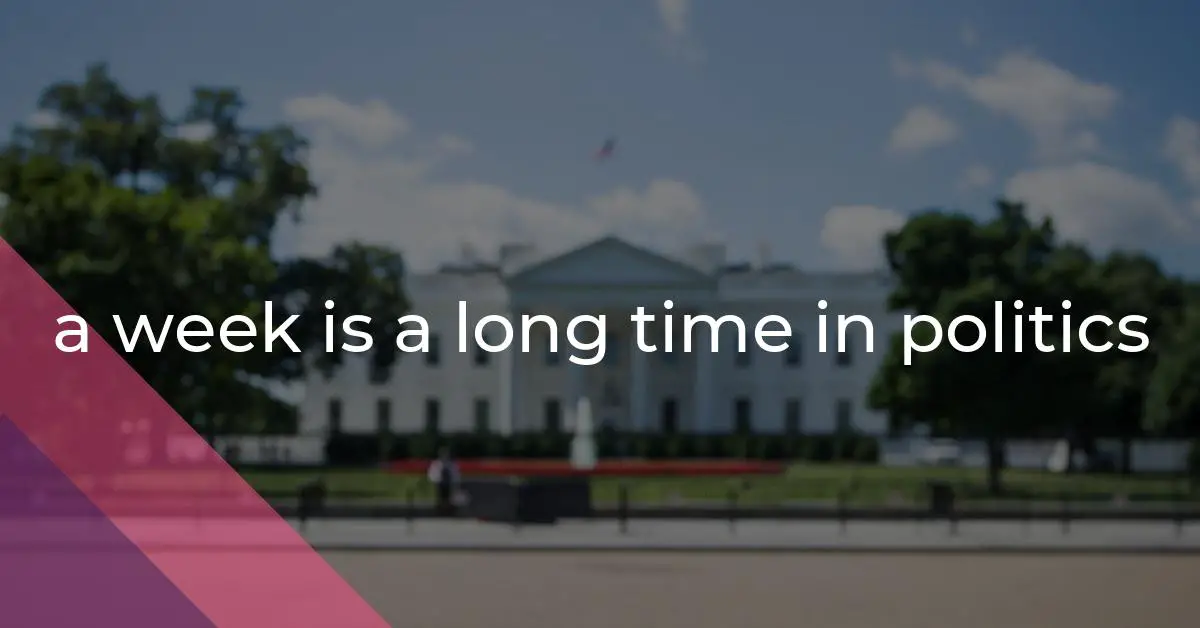a week is a long time in politics: Idiom Meaning and Origin
What does ‘a week is a long time in politics’ mean?
The idiom "a week is a long time in politics" means that political situations can change rapidly and dramatically even within a short period, emphasizing the volatile and unpredictable nature of the political landscape.

Idiom Explorer
The idiom "lead time" refers to the amount of time needed to carry out a task or complete a project. It represents the period between the initiation and the completion of a particular activity or process.
The idiom "in the long term" refers to a period of time that is far into the future, usually indicating a result or consequence that will be realized after a significant amount of time or over an extended period. It emphasizes the importance of considering the potential outcomes or impacts over a longer timeframe rather than focusing solely on short-term effects.
The idiom "in the long run" means considering the overall or ultimate outcome or result of a situation, especially over a period of time, rather than focusing on immediate or short-term effects.
The idiom "in the blink of an eye" means something happening extremely quickly or instantaneously.
An idiom meaning a controversial issue or situation that is difficult to handle, and often passed quickly from person to person to avoid dealing with it.
The idiom "from time to time" means occasionally or at intervals, not frequently. It implies that something happens occasionally, but not on a regular basis.
The idiom "from here to Sunday" means extensively or thoroughly. It emphasizes the vastness or completeness of something happening or being done.
Ever-changing Landscape: A Week's Moments
The idiom "a week is a long time in politics" captures the idea that political events and circumstances can change rapidly and dramatically within a short period. It has become a common phrase, particularly in the United Kingdom, with its origin attributed to Canadian-born British politician Sir Harold Wilson.
Sir Harold Wilson, who served as the Prime Minister of the United Kingdom in the 1960s and 1970s, popularized the idiom with his statement during a speech in 1964. He effectively conveyed the essence of the idiom, and since then, it has gained widespread recognition.
The meaning of the idiom is straightforward: politics is a swiftly changing landscape where even a week's time can feel like a significantly long period. New developments, shifts in public opinion, and unexpected events can have a profound impact on the political climate.
Furthermore, the idiom highlights the volatility of politics. Political fortunes can rise and fall rapidly, rendering previous assumptions or predictions obsolete within a short span of time. Factors like changing public sentiment, scandals, policy decisions, or unplanned events can disrupt the political landscape.
The popularity and continued usage of the idiom in political discourse reflect the recognition of the erratic and dynamic nature of politics. It serves as a reminder that political outcomes are seldom static, cautioning against premature or overly confident judgments about the course of political events.
While the idiom originated in politics, its usage has expanded to various domains beyond politics. It is employed to convey the rapid pace of change in any unpredictable or fluid situation, emphasizing the need for caution even in short-term predictions.
The idiom invites reflection on the nature of time itself. It prompts us to consider how the passage of time can influence perceptions, priorities, and outcomes in different areas of life. The idiom has become a timeless expression of the capriciousness found not only in politics but also in wider cultural contexts.
The idiom "a week from next Tuesday" is related to the phrase "a week is a long time in politics." It implies a longer timeframe than a typical week, suggesting that political events and circumstances can change dramatically and unexpectedly over an extended period. This idiom highlights the unpredictability of politics and serves as a metaphor for the dynamic nature of the political landscape.
Similarly, the idiom "in the long term" emphasizes the importance of considering the future outcomes and impacts of political decisions, rather than solely focusing on immediate consequences. It recognizes that political actions can have far-reaching effects that may not be immediately apparent. By linking this idiom to "a week is a long time in politics," we underscore the need to view political events and developments in a broader context and consider their long-term implications.
The idiom "as the day is long" is another related expression. It suggests that a particular situation or circumstance is extensive in duration or scope, much like a full day. When connected to "a week is a long time in politics," this idiom reinforces the idea that political events can have a significant and lasting impact. It emphasizes the need to recognize the potential magnitude of political changes and not underestimate their effects.
The idiom "a week is a long time in politics" captures the swift and changing nature of political events and circumstances. It has become a widely used phrase in political discourse, reflecting the recognition of the unpredictable and dynamic aspects of politics. Additionally, the related idioms "a week from next Tuesday," "in the long term," and "as the day is long" further emphasize the volatility and lasting effects of political developments. By acknowledging the interconnectedness of these idioms, we gain a deeper understanding of the ever-evolving landscape of politics and the need for thoughtful consideration of its implications.
Example usage
Examples of how the idiom "a week is a long time in politics" can be used in a sentence:
- A politician's popularity can change drastically over the course of a week, demonstrating just how true the idiom "a week is a long time in politics" is.
- One scandal can completely shift the political landscape in a matter of days, proving the accuracy of the idiom "a week is a long time in politics."
- A week of intense negotiations and public scrutiny can make or break a political career, highlighting the significance of the idiom "a week is a long time in politics."
More "Politics" idioms



